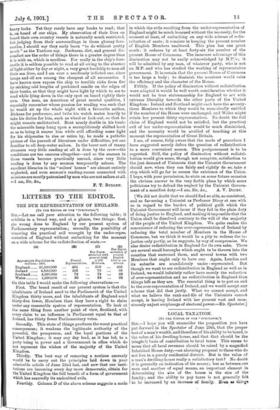LETTERS TO THE EDITOR.
THE DUE REPRESENTATION OF ENGLAND.
[TO VIZ EDITOR Or TAR "SPECTATOR."]
Ste,—Let me call your attention to the following table ; it exhibits in a broad way, and at a glance, two things : first, the wrong done to England by our present system of Parliamentary representation; secondly, the possibility of removing the practical evil wrought by the under-repre. sentation of England without embarking for the moment on a wide scheme for the redistribution of seats :— (B) (C)
DU. Repro-
Due Repro- sentation if sentation with present present total English of 670 total is un- Moinbers. altered.
England 31,000,000 ... 465
600 ... 405 Ireland 4,500,000 ... 103
73 ... 68 Scotland 4,500,000 ... 72
•••
73 ... 68 Wales 1,500,000 ... 30
24 23
On this table I would make the following observations:—
First. The broad result of our present system is that the inhabitants of Ireland send to the Parliament of the United Kingdom thirty more, and the inhabitants of England send thirty-five fewer, Members than they have a right to claim under any reasonable system of representation. To look at the same thing from another point of view, Scotland, with every claim to an influence in Parliament equal to that of Ireland, has thirty fewer Parliamentary votes.
Secondly. This state of things produces the worst practical consequences; it weakens the legitimate authority of the powerful, the prosperous, and the loyal portions of the United Kingdom; it may any day lead, as it has led, to a party being in power and a Government in office which do not represent the wishes of the majority of the United Kingdom.
Thirdly. The best way of removing a noxious anomaly would be to carry out the principles laid down in your admirable article of June 22nd last, and now that onr insti- tutions are becoming every day more democratic, obtain for the United Kingdom the full benefit of a form of government which has assuredly its undoubted evils.
Fourthly. Column D of the above scheme suggests a mode
(A)
Approximats Population in millions: 1901.
Present Representation.
in which the evils resulting from the under-representation of England might be ranch lessened without the necessity, for the moment at least, of embarking on any wide scheme of redis- tribution of seats; it consists in keeping the present number of English Members unaltered. This plan has one great merit : it reduces by at least forty-six the number of the present House of Commons. The immense advantage of this diminution may not be easily acknowledged by ; it will be admitted by any man, of whatever party, who is not an M.P. and who has studied the working of representative government. It is certain that the present House of Commons is too large a body ; to diminish the numbers would raise the efficiency and the character of the House.
Fifthly. If the policy of diminution without redistribution were adopted it would be well worth consideration whether it would not be true• statesmanship for England to act with extreme liberality towards the other parts of the United Kingdom: Ireland and Scotland might each have the seventy- three Members to which they would be numerically entitled if the number of the House were unchanged, and Wales might retain her present thirty representatives. No doubt the full claim of England would not be satisfied, but the practical evil of her under-representation would be much diminished, and the necessity would be avoided of touching at this moment the representation of Great Britain.
I am, of course, fully aware that the mode of procedure I have suggested merely defers the question of redistribution to a more convenient season. This postponement is to be regretted. Still, the policy of diminution without redistri- bution would give some, though not complete, satisfaction to the just demand of Unionists that the Unionist Government should now, when they can fairly and rightly do so, take a step which will go fax to secure the existence of the Union. I hope, with your permission, to state on some future occasion the obvious answer to the very feeble pleas by which some politicians try to defend the neglect by the Unionist Govern-
ment of a manifest duty.—I am, Sir, &c., A. V. DICEY.
[We did not doubt that we should find so able, so consistent, and so far-seeing a Unionist as Professor Dicey at one with us in regard to the burden of political guilt which the Unionist Government will incur if they fail in the plain duty of doing justice to England, and making it impossible that the Union shall be dissolved contrary to the will of the majority of the people of the United Kingdom. We quite realise the convenience of reducing the over-representation of Ireland by reducing the total number of Members in the House of Commons, but we think it would be a pity to redress the in- justice only partly, as he suggests, by way of compromise. We also desire redistribution in England for its own sake. There are several small boroughs which ought to be thrown into the counties that surround them, and several towns with two Members that ought only to have one. Again, London and its suburbs are scandalously under - represented. But though we want to see redistribution in England as well as in Ireland, we would infinitely rather have merely the reduction of over-representation and no redistribution in England than things left as they are. The essential thing is to put an end to the over-representation of Ireland, and we would accept any scheme that did that justly. What we cannot accept, and what we believe the rank-and•file of the Unionists cannot accept, is leaving Ireland with her present vast and mon- strously unjust surplusage of electoral power.—En. Spectator.]


















































 Previous page
Previous page